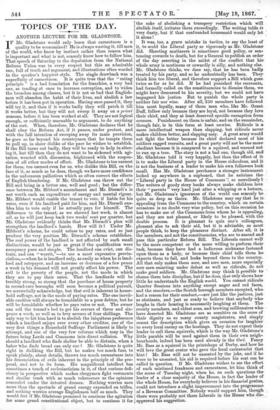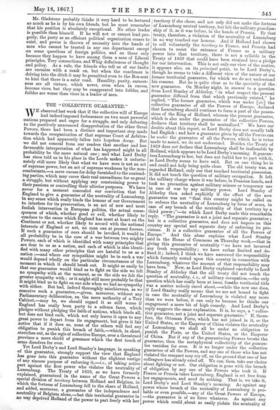TOPICS OF THE DAY.
. ANOTHER LECTURE FOR MR. GLADSTONE.
IF Mr. Gladstone would only learn that earnestness is a quality to be economized! He is always wasting it, till men of the world, who know by instinct rather than reason what is important and what is not, scarcely know how to follow him. That speech of Saturday to the deputation from the National Reform Union was in every respect but this an admirable one, full of truth and argument, and illustrations often worded • in the speaker's happiest style. The single drawback was a superfluity of earnestness. It is quite true that the "rating ' principle " is a bad foundation for the franchise, a very bad one, as tending at once to increase corruption, and to widen the breaches among classes, but it is not so bad that English- men will abandon the habit of their lives, and abolish a law before it has been put in operation. Having once passed it, they will try it, and then if it works badly they will patch it till it works better, but they will not sweep it away on a priori reasons, before it has been worked at all. They are not logical enough, or sufficiently amenable to argument, to do anything of the sort. When, therefore, Mr. Gladstone declares that he shall obey the Reform Act, if it passes, under protest, and with the full intention of sweeping away its main provision, he goes so far beyond his countrymen that he tempts them to pull up, in sheer dislike of the pace he wishes to establish. If the Bill turns out badly, they will be ready to help in alter- ing it, but till then they do not want to be sickened with agi- tation, wearied with discussion, frightened with the suspen- sion of all other modes of effort. Mr. Gladstone is too earnest for them, too earnest even for us, who dislike this Bill, on the face of it, as much as he does, though we have more confidence in the unforeseen palliatives which so often correct the effects of English blundering. If Mr. Gladstone can throw out the Bill and bring in a better one, well and good ; but the differ- ence between Mr. Hibbert's amendment and Mr. Disraeli's is not worth such an expenditure of energy and mental vigour. Mr. Hibbert would enable the tenant to vote, if liable for his rates, even if his landlord paid for him, and Mr. Disraeli ena- bles him to vote only if he actually pays for himself. The difference to the tanant, as we showed last week, is almost nil, as he will just keep back two weeks' rent per quarter, but Mr. Gladstone evidently thinks that Mr. Disraeli's plan will strengthen the landlord's hands. How will it ? Under Mr. Hibbert's scheme, he could refuse to pay rates, and so just produce the very position Mr. Disraeli's scheme establishes. The real power of the landlord is not affected by such small distinctions, would be just as great if the qualification were occupancy pure and simple. The landlord can evict, can dis- train, and can " worrit,"—to use a most expressive provin- cialism,—when he is landlord only, as easily as when he is land- lord and ratepayer, and an increase or decrease of a few pence a week in his demand will not greatly affect his power. The evil is the poverty of the people, not the mode in which they are to pay their rates. That the landlords will be terribly strong, so strong that the purchase of house property in second-rate boroughs will soon become a political pursuit, we sorrowfully acknowledge, but that evil is inherent in house- hold suffrage, not in the mode of paying rates. The one inevit- able creditor will always be formidable to a poor debtor, but he will be formidable whether he pays rates or not. The owner can sell the tenant's bed to get his arrears of three and six- pence a week, as well as to levy arrears of four shillings. The only way to hit him hard is to abolish the iniquitous preference which a landlord enjoys over every other creditor, one of the very first things a Household Suffrage Parliament is likely to attempt, and one of the very few reforms which may in the future bring Lords and Commons into direct collision. Why should a landlord who finds shelter be able to distrain, when a baker 'who finds bread can only sue ? Mr. Gladstone is quite right in disliking the Bill, but he makes too much fuss, to speak plainly, about details, throws too much earnestness into his denunciation of evils inherent in the principle of the pro- posal, and not in its form. His magnificent intellect has sometimes a touch of ecclesiasticism in it, of that curious defi- ciency in perspective which makes clergymen fight vestments and similar trash with as much vehemence as the opinions concealed under the detested dresses. Nothing worries men more than the spectacle of grand energy expended on trifles, and nothing worries average Englishmen half so much. They would fret if Mr. Gladstone promised to continue the agitation for some grand constitutional object, but to continue it for the sake of abolishing a trumpery restriction which wiII abolish itself, irritates them exceedingly. The writing table is very dusty, but if that confounded housemaid would only let it alone It was, too, a grave mistake in tactics, to say the least of it, to scold the Liberal party so vigorously as Mr. Gladstone did. Shooting mutineers is sometimes good policy, or sen- tencing cowards to death, but for a General to publish an order- of the day asserting in the midst of the conflict that his whole army is mutinous or cowardly is silly, and nothing else. Mr. Gladstone thinks-, we dare say, that he has been badly treated by his party, and so he undoubtedly has been. They- think him too liberal, and therefore support a Bill which goes- twice as far as he did. If he had punished the recreants,. had formally called on the constituencies to dismiss them, we might have demurred to his severity, but we could not have impugned his justice. But to punish the whole party is neither fair nor wise. After all, 250 members have followed him most loyally, many of them men who, like Mr. Grant. Duff, follow only because they are loyal, not because they love their chief, and they at least deserved specific exemption from censure. Punishment on them is unfair, and on the remainder,. though fair, is in this form at least unwise. Ridicule is a more intellectual weapon than slapping, but ridicule never snakes children better, and slapping may. A great army would not fight the better because its chief declared most of his soldiers ragged recruits, and a great party will not be the more obedient because it is compared to a squirrel, and warned not to run up a tree. The story is not a bad one, though old, and Mr. Gladstone told it very happily, but then the effect of it. is to make the Liberal party in the House ridiculous, and it is not the business of a leader to make his own followers look small. Has Mr. Gladstone perchance a stronger instrument locked up anywhere in a cupboard, that he satirizes the "Liberal party in the House of Commons so mercilessly The writers of goody story books always make children love their " parents ' very hard just after kwhipping or a lecture,. . but Mr. Gladstone's ignorance of the world can scarcely be so deep as theirs. Mr. Gladstone. may say that he is. appealing from the Commons to'the country, which on certain. . occasions is no doubt very wise policy, but on this occasion he has to make use of the Commons from whom he is appealing, and they are not pleased, or likely to be pleased, with the double process. It is pleasant to quiz one's colleagues, pleasant also to ask their aid, but it is advisable, as most people think, to keep the pleasures distinct. After all, it is the members, and not the constituencies, who are to amend and pass this particular Reform Bill. The Liberals cannot well be the more competent or the more willing to perform their task, because they have had a ludicrous nickname fastened upon them as a body, or because their chief tells them he' expects them to fail, and looks beyond them to the country.. All that only makes them sore, and sore men, more especially sore men smarting under defeat as well as ridicule, do not make good soldiers. Mr. Gladstone may think it possible to- shame them into discipline, but if he does, that only shows how little he understands the English world. You cannot ridicule Quarter Sessions into anything except anger and red faces, and the seceders,—the Scotch borough members excepted, who had a reason for their conduct,—are just like the justices, just as obstinate, and just as ready to believe that anybody who laughs in their hearing is necessarily laughing at them. • The county members, and eldest sons, and brewing millionaires who. have deserted Mr. Gladstone are as sensitive on the score of their dignity as so many county magistrates, and simply resent the description which gives an occasion for laughter . to every local enemy on the hustings. They do not expect their leader to call them squirrels, which is the way Mr. Gladstone's. little parable will be used against them in their own neigh- bourhoods, indeed has been used already in the Owl. Fancy Mr. Bass as a squirrel in the printshops of Derby, and how he will love the great orator who gave the local caricaturist that hint 1 Mr. Bass will not be unseated by the joke, and if he were to be unseated, his aid is required before his seat can be' called in question. If Mr. Gladstone wishes to see the effect of such mistimed frankness and earnestness, let him think of the scene of Tuesday night, when he, on such questions the leader of a clear majority of the House, in fact the leader of the whole House, for everybody believes in his financial genius, could not introduce a slight improvement into the programme of a Revenue Committee. Nobody would support him, though there were probably not three Liberals in the House who dis-_. approved his suggestion.
Mr. Gladstone probably thinks it very hard to be lectured so much as he is by his own friends, but he must remember that his position is absolutely exceptional. No other leader is possible than himself. If he will not or cannot lead pro- perly, the party as an efficient political organization ceases to .exist, • and power is thrown of necessity into the hands of men who cannot be trusted in any one department except .on some questions of foreign politics, and on those only because they happen to have among them a man of Liberal ,principles, Tory connections, and Whig definiteness of thought and policy. As a rule, the friends who tell us of our faults are enemies with a mask on, but when the coachman is -driving into the ditch it may be permitted even to the Box-seat to hint that there is a safer road. Humility, purity, earnest- ness are all virtues, which never, even when in excess, become vices, but they may be exaggerated into foibles, and boibles are worse than vices in a leader of men.































 Previous page
Previous page